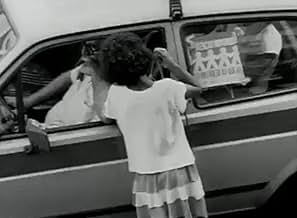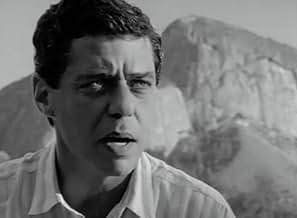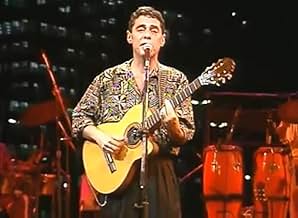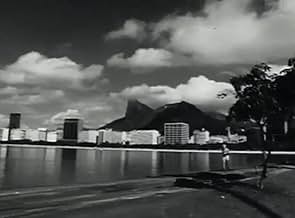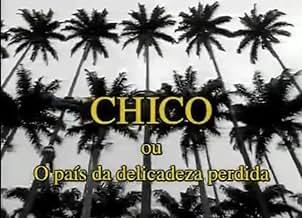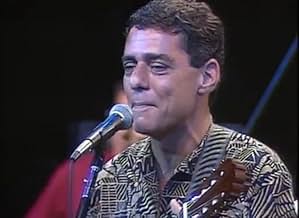Füge eine Handlung in deiner Sprache hinzuA look into the 25 years of career of famous musician Chico Buarque and his influence in Brazilian culture.A look into the 25 years of career of famous musician Chico Buarque and his influence in Brazilian culture.A look into the 25 years of career of famous musician Chico Buarque and his influence in Brazilian culture.
Paulo José
- Narração
- (Synchronisation)
Sílvia Buarque
- Self
- (Archivfilmmaterial)
- (Nicht genannt)
Luiz Inácio Lula da Silva
- Self
- (Archivfilmmaterial)
- (Nicht genannt)
Eliezer Gomes
- Gismundo
- (Archivfilmmaterial)
- (Nicht genannt)
Juscelino Kubitschek
- Self
- (Archivfilmmaterial)
- (Nicht genannt)
Jeanne Moreau
- Joana
- (Archivfilmmaterial)
- (Nicht genannt)
Marieta Severo
- Self
- (Archivfilmmaterial)
- (Nicht genannt)
José Wilker
- Lorde Cigano
- (Archivfilmmaterial)
- (Nicht genannt)
Empfohlene Bewertungen
To follow MPB singer/composer Chico Buarque and his views on Brazil is also a way to see and follow the history of a nation through a long period
of time that goes even before he was born. It's also a way to see the musical evolution through many decades and how he played such music with different
variations (popular music, samba, bossa nova, etc). This documentary on Buarque, made by future cinema director Walter Salles Jr. And the compositor/journalist
Nelson Motta, chronicles a parallel between the artist, his music and Brazilian society during its many historical transitions of which the singer was an
important part of it, through his songs and idealisms.
The film combines interviews with Chico Buarque, a concert performance which includes guests Gilberto Gil and Gal Costa; a presentation of facts about him, and the many social challenges happening in Brazil up until that point (some of them still present, like poverty, abandoned children and the contrast of the country's natural beauty admired by foreigners), with chapters narrated by veteran actor Paulo José, covering Buarque's career of more than 20 years, back then.
It's an interesting mix of elements wrapped in some confusion of ideas that are slightly engaging. It's hard to form a full view on everything since there's few moments of good interviews with Buarque, some memories but far from a critical biographical take or a much of thoughtful way to understand what inspired his songs. There are some omissions - the genial "Construção" is never talked about neither performed, and most of what's shown in concerts and some presentations from the narrator revolve on either the sambas or the songs used in film soundtracks such as the themes from "Joana Francesa", "Bye Bye Brazil" or "Dona Flor e Seus Dois Maridos" (those moments were great since we have the film clips shown and it allows to see his importance on film music).
While I'm a great admirer of the man, his views and some of his compositions, I wasn't completely hooked with the show performance (except when Gil and Gal showed up). The instruments sounded a lot higher than his voice in some numbers, barely allowing a great hearing of his voice or what he was singing. Yet I think his fans might enjoy it a lot.
Gets a word of praise from me due to its historical archive and the reflective nature of an artist on the nation he lives and loves, hopefully dreaming of a better place with education, fairness and without the typical social contrasts that divides its population. He made plenty of poetical criticisms during the lead years of dictatorship, but one can also see and admire how much he said about the greatness of Brazil through his words, spoken or sung. 7/10.
The film combines interviews with Chico Buarque, a concert performance which includes guests Gilberto Gil and Gal Costa; a presentation of facts about him, and the many social challenges happening in Brazil up until that point (some of them still present, like poverty, abandoned children and the contrast of the country's natural beauty admired by foreigners), with chapters narrated by veteran actor Paulo José, covering Buarque's career of more than 20 years, back then.
It's an interesting mix of elements wrapped in some confusion of ideas that are slightly engaging. It's hard to form a full view on everything since there's few moments of good interviews with Buarque, some memories but far from a critical biographical take or a much of thoughtful way to understand what inspired his songs. There are some omissions - the genial "Construção" is never talked about neither performed, and most of what's shown in concerts and some presentations from the narrator revolve on either the sambas or the songs used in film soundtracks such as the themes from "Joana Francesa", "Bye Bye Brazil" or "Dona Flor e Seus Dois Maridos" (those moments were great since we have the film clips shown and it allows to see his importance on film music).
While I'm a great admirer of the man, his views and some of his compositions, I wasn't completely hooked with the show performance (except when Gil and Gal showed up). The instruments sounded a lot higher than his voice in some numbers, barely allowing a great hearing of his voice or what he was singing. Yet I think his fans might enjoy it a lot.
Gets a word of praise from me due to its historical archive and the reflective nature of an artist on the nation he lives and loves, hopefully dreaming of a better place with education, fairness and without the typical social contrasts that divides its population. He made plenty of poetical criticisms during the lead years of dictatorship, but one can also see and admire how much he said about the greatness of Brazil through his words, spoken or sung. 7/10.
Wusstest du schon
- VerbindungenFeatures Rio, 40 Graus (1955)
- SoundtracksNão Existe Pecado Ao Sul do Equador
Written by Chico Buarque and [ink=nm0346087]
Performed by Chico Buarque
Top-Auswahl
Melde dich zum Bewerten an und greife auf die Watchlist für personalisierte Empfehlungen zu.
Details
- Erscheinungsdatum
- Herkunftsländer
- Sprache
- Auch bekannt als
- Chico - O País da Delicadeza Perdida
- Produktionsfirma
- Weitere beteiligte Unternehmen bei IMDbPro anzeigen
- Laufzeit45 Minuten
- Farbe
Zu dieser Seite beitragen
Bearbeitung vorschlagen oder fehlenden Inhalt hinzufügen

Oberste Lücke
By what name was Chico ou o País da Delicadeza Perdida (1989) officially released in Canada in English?
Antwort
